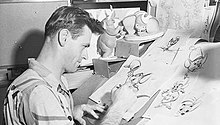
Back فولفجانج ريثرمان Arabic ولفجانج ريثيرمان ARZ Wolfgang Reitherman BCL Волфганг Райтерман Bulgarian Wolfgang Reitherman Catalan ڤۆڵفگانگ ڕیزەرمان CKB Wolfgang Reitherman German Βόλφγκανγκ Ράιτερμαν Greek Wolfgang Reitherman Spanish Wolfgang Reitherman Basque
Wolfgang Reitherman | |
|---|---|
 Reitherman in 1940 | |
| Born | June 26, 1909 |
| Died | May 22, 1985 (aged 75) Burbank, California, U.S. |
| Other names | Woolie Reitherman Wooly Reitherman |
| Alma mater | Pasadena Junior College Chouinard Art Institute |
| Occupations |
|
| Years active | 1933–1981 |
| Employer | Walt Disney Animation Studios (1933–1942, 1947–1981) |
| Known for | One of Disney's Nine Old Men |
| Spouse |
Janie Marie McMillan
(m. 1946) |
| Children | 3, including Bruce Reitherman |
Wolfgang Reitherman (June 26, 1909 – May 22, 1985), also known and sometimes credited as Woolie Reitherman, was a German-American animator, director and producer. As a member of the "Nine Old Men" at Walt Disney Productions, Reitherman was known for his action-oriented animation.[1]
Born in Munich, Reitherman relocated to the United States with his family. He attended Pasadena Junior College and briefly worked as a draftsman for Douglas Aircraft Company. Desiring a career in visual arts, Reitherman studied at the Chouinard Art Institute. On the advice of an art instructor, Reitherman applied as an animator for Walt Disney Productions. Reitherman animated on several Silly Symphonies cartoon shorts. He next animated the Slave in the Magic Mirror in Snow White and the Seven Dwarfs (1937), Monstro in Pinocchio (1940), and the climactic dinosaur fight in Igor Stravinsky's "Rite of Spring" segment of Fantasia (1940).
By 1941, the United States entered World War II, and Reitherman enlisted into the United States Army Air Forces (USAAF). While in service, he flew on several combat missions and was awarded the Distinguished Flying Cross. In 1947, Reitherman returned to the Disney studios as an animator, and within a few years, became a member of Disney's "Nine Old Men". He made his directorial debut with the 1957 short film The Truth About Mother Goose; within years, he became the first sole director for a Disney animated feature, beginning with The Sword in the Stone (1963).
During production on The Jungle Book (1967), Walt Disney died, and Reitherman assumed the creative leadership, remaining as director and producer on several consecutive Disney animated feature films throughout the 1970s. Additionally, he directed the Winnie the Pooh featurettes: Winnie the Pooh and the Honey Tree (1966) and Winnie the Pooh and the Blustery Day (1968), which won the Academy Award for Best Animated Short Film.
By 1977, Reitherman had intended to direct The Fox and the Hound (1981), but he left the project after having creative differences with Art Stevens. After developing unproduced animation projects, Reitherman retired from Disney in 1981. In 1983, he was awarded the Winsor McCay Award, and in 1985, Reitherman died in a single-car accident. He was posthumously honored as a Disney Legend in 1989.
- ^ Finch 2000, p. 38.